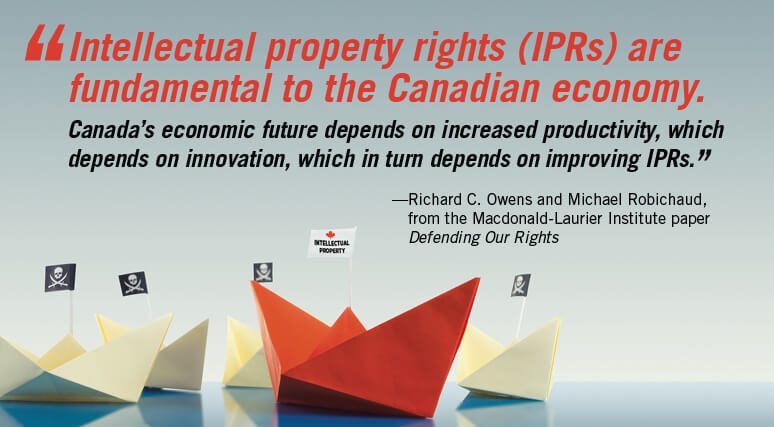New Macdonald-Laurier Institute paper explores how Ottawa can develop an intellectual property strategy that makes ideas an engine for job creation
OTTAWA, May 11, 2017 – A new Macdonald-Laurier Institute paper, the first of a series, is urging Ottawa to be bold in protecting the rights of creators and innovators as it follows through on a promise to develop an intellectual property strategy for Canada.
Ottawa deserves credit for promising, as part of the 2017 federal budget, to develop an intellectual property strategy. Now the hard work – of developing an IP regime that protects creators and incentivizes ideas that drive the economy – begins.
To read the full paper, titled “Defending Our Rights: Why intellectual property protection matters to Canada”, click here.
Canada’s economic future depends on increased productivity, which depends on innovation, which in turn depends on improving intellectual property rights.
 The paper, written by intellectual property thought leaders Richard Owens, MLI’s Munk Senior Fellow on Innovation, and researcher Michael Robichaud, is the first of a series of three. The papers will examine the importance of strong intellectual property rights (IPRs) review Canada’s record on intellectual property protection, and seek opportunities to better position Canada to be a world leader on IP rights, rather than a laggard.
The paper, written by intellectual property thought leaders Richard Owens, MLI’s Munk Senior Fellow on Innovation, and researcher Michael Robichaud, is the first of a series of three. The papers will examine the importance of strong intellectual property rights (IPRs) review Canada’s record on intellectual property protection, and seek opportunities to better position Canada to be a world leader on IP rights, rather than a laggard.
“Canada has an advanced and relatively current set of IP laws, and makes inroads into having a robust innovation economy”, they write. “But Canadian tendencies and influences in the country regarding IPRs are worrisome. The coming strategic renewal should be a great opportunity to refresh a Canadian approach that has been recently wayward and misdirected”.
Canada was almost alone (with South Africa) among G20 nations in seeing a substantial decline in research and development spending between 2004 and 2014. Canada also has had middling rankings in international indices on innovation and IPRs (intellectual property rights), and has taken up residence on the “watch list” in the Office of the US Trade Representative’s Special 301 Report.
“The coming strategic renewal should be a great opportunity to refresh a Canadian approach that has been recently wayward and misdirected” -Richard Owens and Michael Robichaud
Getting it right on intellectual property is essential for job creation.
Creating new products is the key to economic growth, which is where strong intellectual property protection comes in.
Predictable and stable property rights may be old school, and necessarily invoke trust in the invisible hand of the market, but they work. They are the only system that does, or can.
Owens and Robichaud paper make several recommendations for the government:
- Be bold. End term limits for copyright: Copyright protection does nothing to reduce the store of common property. Copyright does not even create a monopoly, and there is no reason it should be singled out from other types of property for expiry. This would be a bold move demonstrating global leadership in IP. In the more conservative alternative, adopt the already widely-used term of 70 years plus the life of the author, gaining Canadian creators the like benefit in European markets.
- Don’t fear the Harvard mouse. Protect wide patent subject matter: Out of step with all OECD May 2017 3 countries and with the plain wording of Canada’s Patent Act, the Supreme Court of Canada ruled that so-called “higher life forms” could not be patented in the case of the “Harvard mouse”. The decision was a blow to Canada’s life sciences industry, and the case brings into doubt all future, unknown classes of patent. Accordingly, Canada should legislate patent protection for higher life forms, and interpretative principles for the Patent Act that make it clear that anything under the sun (or indeed, elsewhere in the universe) made by man and that meets the standards of the Patent Act, is patentable, subject only to express, legislated exceptions.
- Help the little guy. Facilitate patenting by SMEs: Small and medium size businesses drive much of Canada’s innovation economy. They tend to be insufficiently grounded in the possibilities of IP to help to grow their businesses. Accordingly, we recommend to facilitate patenting by SMEs, perhaps by reducing or waiving fees for first patents, and further publicizing the value of IP protection.
- Catch up to the world. Implement trade agreements and their IP provisions: Canada is lucky to have rigorously negotiated, sound agreements to open trade in the Pacific Rim and to Europe, the TPP and CETA respectively. The former, admittedly, is in considerable doubt at the moment. Still, the IP requirements of these agreements will benefit Canada. Accordingly, it is our recommendation to implement the TPP and CETA, subject to other signatory nations doing so, and continue to further support freer and harmonized trade in IPR-protected goods.
***
Richard Owens is a Munk Senior Fellow with the Macdonald-Laurier Institute and lawyer who has specialized in business and commercial law, regulation of financial institutions, intellectual property and technology.
Michael Robichaud is a researcher for the Macdonald-Laurier Institute. He is currently working towards completing a combined J.D/Master of Public Policy degree at the University of Toronto following a joint honours degree in history and political science at McGill University.
The Macdonald-Laurier Institute is the only non-partisan, independent national public policy think tank in Ottawa focusing on the full range of issues that fall under the jurisdiction of the federal government.
For more information, please contact Mark Brownlee, communications manager, at 613-482-8327 x105 or email at mark.brownlee@macdonaldlaurier.ca.





